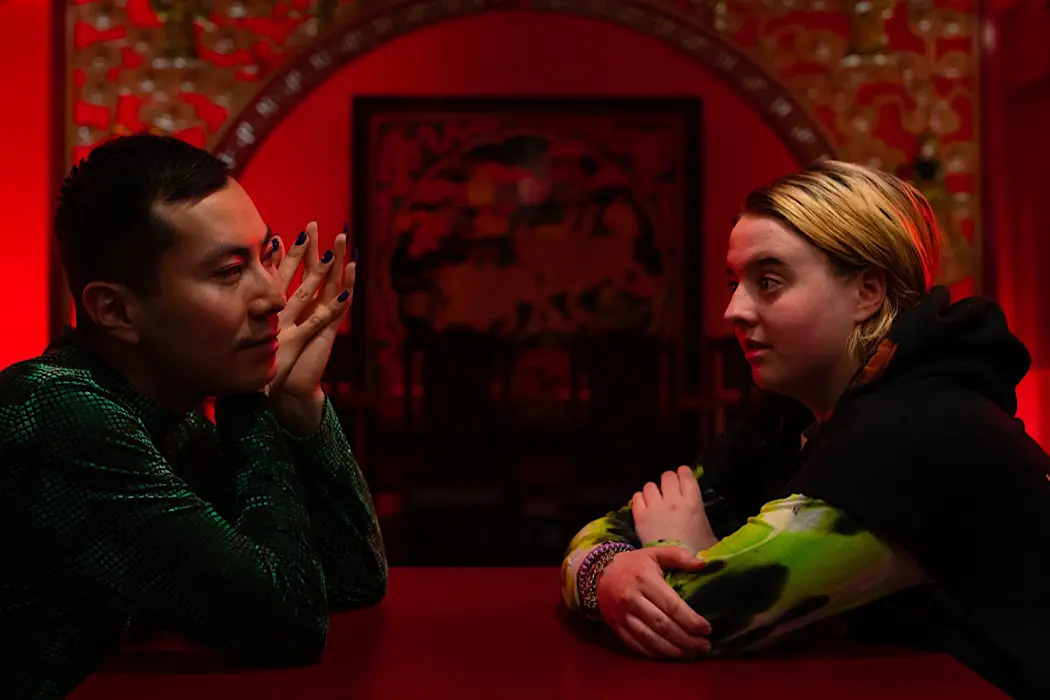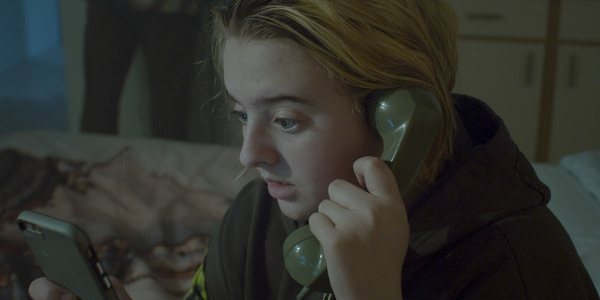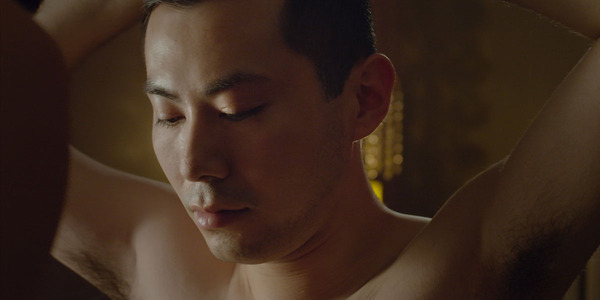QUEENS OF THE QING DYNASTY: Diabolical Friends Conquer Empires

Payton McCarty-Simas is a freelance writer and artist based in…
Two young women stand before a long window in a hospital, watching a nurse swaddle a baby in fresh, white cloth. “It must be painful, coming into this world alone,” An (Zheng Ziyin), a transgender Chinese student and hospital volunteer, tells Star (Sarah Walker), her self-described mentally ill charge, who’s recovering from a suicide attempt. “It’s like an evil hug,” Star remarks of the swaddling, a note of envy in her voice. “I want to be one of those babies, swaddled really tight so I don’t have to do anything,” An replies. The baby cries, fusses, is soothed in its immobility. The women look on, envious and leery, united by the fascinatingly ambivalent relationship to institutional control that propels Ashley McKenzie‘s mesmerizing new film, Queens of the Qing Dynasty, currently screening at Metrograph.
“About to Expire”
Shot on location in McKenzie‘s home, Unama’ki–Cape Breton Island, Canada, with members of the community in its starring roles, Queens of the Qing Dynasty explores how different forms of marginalization shape two people’s lives on an intimate, granular scale using the impersonal machine of social governance as its backdrop. In Star’s words, both of these women are “about to expire” in one way or another: An’s visa will literally expire soon and she will be forced to return to China unless she can find either work or a Canadian spouse, while Star, whose life has been defined by hospitals and government programs, is now a legal adult and must learn to navigate the world–– and the systems that will continue to shape her life–– on her own, or end up homeless.

By bringing us into Star’s perspective, the world of “psych wings” and social workers is made both familiar and strange. Random fragments of song and small snorts of laughter punctuate the otherwise sterile order of daily tasks that officials find a routine. People keep telling Star to focus: she takes a test to see if she can live on her own, instructed to turn a knob so a simulated stove top stays green. She looks on intently, transfixed as its concentric rings drift from yellow to red, melting into hallucinogenic mandalas of neon pink.

Later, she grips a plastic bag in her fist, allowing it to tear and feeling its textures on the pads of her fingers while her guardian huffs in frustration, angrily tossing the clothes it was supposed to hold onto the bed. Tight, extended close-ups and strange, meditative silences evoke the rhythms of films like Yorgos Lanthimos‘ The Killing of a Sacred Deer or Jane Shoenbrun‘s We’re All Going to the World’s Fair, yet McKenzie manages to strike her own unique tone through her non-actors idiosyncratic, sometimes startlingly personal performances. Star is focusing, she simply can’t focus on what the world is telling her she must do in order to survive.
Searching for Safety
This tension between security and freedom forms the backbone of the narrative: An longs to be a “trophy wife,” fixating on the titular Chinese monarchs whose nails, a sign of royal status and the doting forms of personal care that come with it, were so long they were unable to perform daily tasks. They have, Star says upon hearing about them, “secret powers”–– their intimate familiarity with the machinations of the palace intrigues at the center of dynastic rule allowed them to transcend their often humble upbringing and become queens, conquering empires through seeming passivity. With her security in doubt at the prospect of ejection from the country she’s made her home, the appeal for An is obvious. Similarly, Star faces her removal from the constellation of social services for homeless, mentally ill youth with numb anxiety. She knows she is incapable of living on her own, and feels comfortable in her cocoon of hospital beds and cartoons on TV.

At the same time, the surveillance and control these systems mandate from their subjects chafes agonizingly, and both resist. In their brief time together before Star must leave the hospital, the two women find a unique connection across the lines of social experience, bonding over their status as socially “evil.” Crosses lurk in the background of most scenes, coloring An’s confession that she has always wanted “a woman’s body” and Star’s assertion that she’s not gay… she’s bisexual. Social precarity is paired with conventional expectations of social productivity, turning their poor, queer, disabled, immigrant bodies into forces of disruption to be categorized and controlled, steered and remade in another image. For example, An’s dysphoria strikes a chord with Star’s fraught relationship to her weight. In one scene, both women’s voices echo over an image of an empty hospital bed and a solitary saline drip on a pole. “I used to be able to see my collarbones… Now I’m all water weight,” Star says. Her body is reduced to its trappings as a person in a hospital. In another, An’s nails are filed into points, dust flying, as she describes the way Canadians “use laws as weapons,” inscribing her resistance to social control on her body.
Conclusion
And yet, in the face of all these pressures, they both refuse to capitulate. Even as they come to terms with their place in these systems, they revel in each other’s uniqueness and point of view, working to strike a balance. Though their life experiences are miles apart, separated by red tape as well as geography, An’s presence renews Star’s sense of possibility and vice versa: “Come be evil with me,” they repeat, over and over, in tones both soothing and insistent. Through each other’s sympathetic eyes, in this winning, queer coming-of-age tale that still feels in a category all its own, these two lonely women become queens.
Watch Queens of the Qing Dynasty
Does content like this matter to you?
Become a Member and support film journalism. Unlock access to all of Film Inquiry`s great articles. Join a community of like-minded readers who are passionate about cinema - get access to our private members Network, give back to independent filmmakers, and more.
Payton McCarty-Simas is a freelance writer and artist based in New York City. They grew up in Massachusetts devouring Stephen King novels, Edgar Allan Poe stories, and Scooby Doo on VHS. Payton holds a masters degree in film and media studies from Columbia University and her work focuses on horror film, psychedelia, and the occult in particular. Their first book, One Step Short of Crazy: National Treasure and the Landscape of American Conspiracy Culture, is due for release in November.













